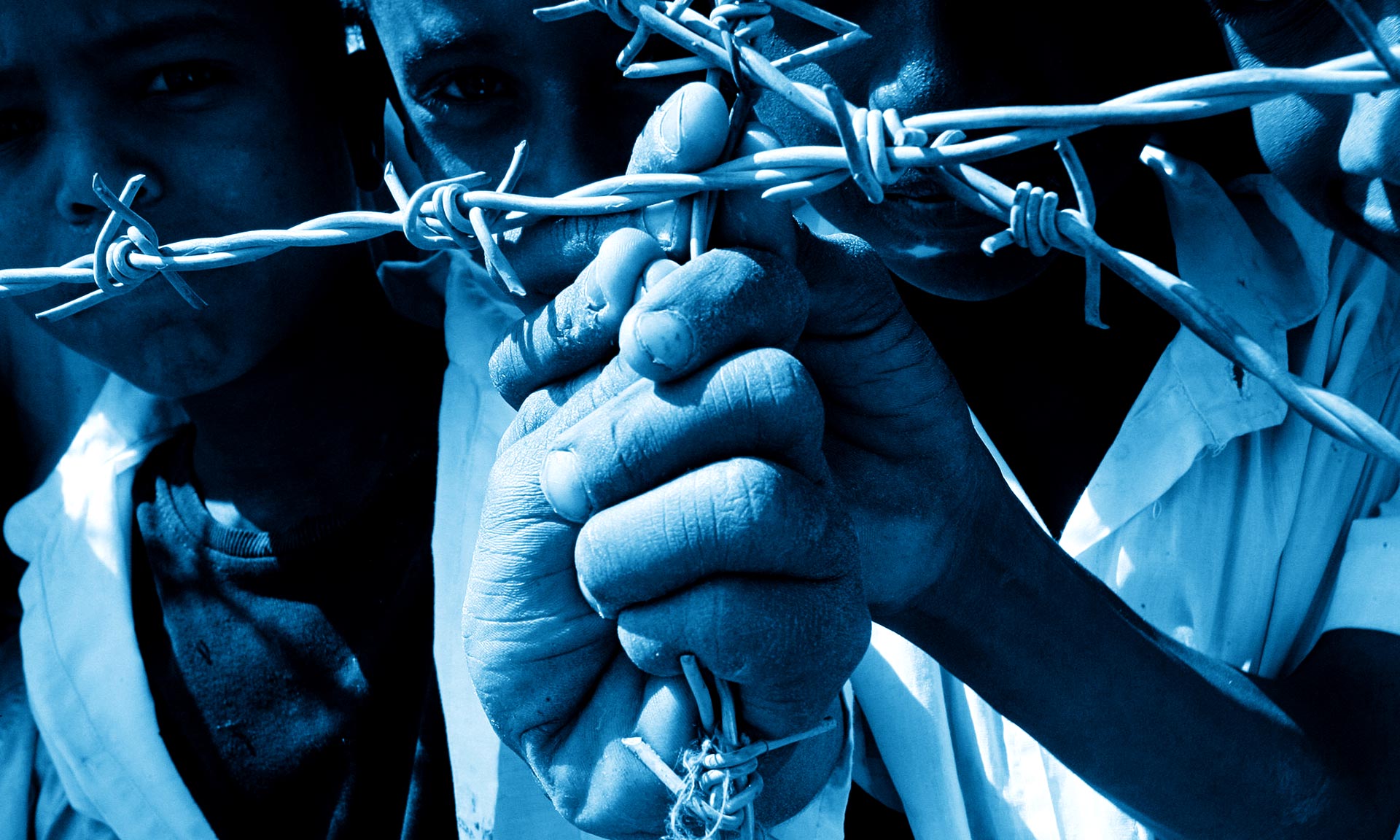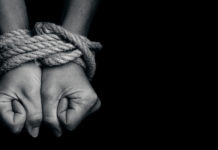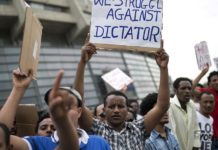Eritrea Focus last year wrote about the latest Home Office statistics – which showed that
Eritrean’s were the largest group claiming asylum in the UK – and also how this meant thousands of Eritreans were being assessed using an unfair and incorrect Country Guidance Information. The situation has not improved in 2016 – it’s just getting worse.
The Independent Advisory Group on Country of Origin Information looked at the Home Office Country Guidance Information and its analysis is damning. The report’s author Dr John Campbell found the Home Office guidance “completely divorced from relevant objective evidence” and “viewed as totally lacking credibility”.
Read the full IAGCI report: www.icinspector.independent.gov.uk/Review-of-Home-Office-CIGs-on-Eritrea-Dec-2015
Despite this the Home Office continues to use this flawed guidance to decide on the validity of Eritrean claims, refusing more and more Eritrean claims for refuge (approximately 88% are refused compared to c. 33% prior to the new guidance) . The Home Office has known about these flaws for months; the IAGCI and the Home Office met in December last year but the Home Office refused to accept the report’s conclusions.
Dr John Campbell’s independent analysis of the Home Office’s guidance on Eritrea echoes previous criticism. Dr Campbell said, “The Home Office report does not conform to the professional standards which country information reports are expected to meet. Instead it is based on a highly selective use of information and it deliberately distorts information to support its own conclusions, namely that it is now safe for the UK to return Eritrean asylum seekers to their home country.
“Since political conditions in Eritrea have not suddenly changed, the only possible explanation for the conclusions reached in this report is that the Home Office wants to block Eritreans – who are among the largest group of individuals seeking asylum here – from acquiring asylum.
“Making decisions about whether or not to grant refugee protection is often a matter of life or death, yet the Government’s own statistics reveal it gets a staggering number of decisions on Eritrean cases wrong.
“The Government should not let its obsession with controlling immigration override its legal and moral responsibility to protect refugees.”
As the Refugee Council points out, “The British judiciary is proving to be equally sceptical about the Government’s decision making on Eritrean asylum claims. The most recent statistics show a staggering 86% of appeals on refusals of Eritrean claims have been overturned by the courts.”
……………………………………
EU Development Fund
At the end of January, the EU Head of Delegation, Christian Manahl, and the Eritrean Minister of National Development, Dr. Giorgis Teklemikael, signed the National Indicative Programme under the 11th EU development Fund programme.
The result of this diplomatic relationship: Eritrea will now receive €200 million to focus on renewable energy and governance. The energy part of the fund is for the EU to help Eritrea build on its current energy and climate change policy. The programme intends to bring clean and efficient energy to all parts of the country including the rural areas. Eritrea will receive €175 million for this part of the programme.
The remainder of the fund, laudably and implausibly, aims to help the government of Eritrea to improve the country’s financial sector, public financial management and to enhance its economic planning. In the recent report, published by the United Nations Security Council Monitoring Group on Somalia and Eritrea (SMEG), the Group warned of‘zero transparency in financial dealings’ in Eritrea and noted the difficulty it came acrosstrying to decipher the difference between the Government and the military. For the European Commission to believe it will solve the financial issues in Eritrea through further funding the corrupt Government is illogical.
Through this programme, the EU also intends to help Eritrea implement the recommendations of the UN-led Universal Periodical Review on Human Rights. Eritrea’s first Universal Periodic Review was in 2009 and the last in 2014.
The last Universal Periodical Review of Eritrea was co-drafted by the Ministry of Foreign Affairs of Eritrea and other departments of the Eritrean Government. For a country that has such a bad track record for human rights abuses, to review its own human rights record is really beyond belief!
The last periodic review states under the part on torture that: ‘‘Torture has already been criminalized in the domestic legal system in particular in the Transitional Penal Code of Eritrea. Moreover, evidence collected under such event is inadmissible in courts of law according to Article 35 of the Transitional Criminal Procedure Code.’ After the UN Commission of Inquiry report, and many accounts from the human rights community such as Human Rights Watch, it seems troubling to see this stated in a ‘UN-led’ report.
The review also reports on the prison system in the country. ‘Since 2009, the prison and rehabilitation services provides access to all inmates to radio, TV including Satellite services and print media to help them get informed and updated on national and international affairs.’ Eritrea has been rated one of the worst countries for freedom of press and expression, so for the Government of Eritrea to state that prisoners are free to watch TV to be better informed of the world is clearly a myth.
It shocks Eritrea Focus, and the greater Eritrean diaspora, that the European Commission has decided to further its relationship with this autocratic state. To fund a state which does not give any hope or freedom to its citizens is making a mockery of what the European Union is supposed to stand for.
Furthermore, to set aside separate funding for the government of Eritrea to follow up on recommendations that it wrote itself seems to have turned the EU’s aid programme into a pantomime!
……………………………………
UN deputy chief’s visit to Eritrea
Last month, Assistant Deputy Secretary General, Kyung-wha Kang visited Eritrea for three days. Kyung-wha Kang spoke out on supporting the Government’s efforts in helping the most vulnerable communities in Eritrea. Ms Kang went on to describe the ‘significant progress in improving child and maternal health’ that Eritrea has made.
Although, the press release does state that the Deputy Secretary General did discuss a ‘full range of challenges facing Eritrea, including human rights’, it is alarming that the she isurging further cooperation with a pariah state.
The Government of Eritrea has done close to nothing for its people and subjects thousands to torture and inhumane treatment. The UN should hold firm in holding the Eritrean government accountable to its appalling actions as it did in the UN COI report. The progress the government has made in the MDG5 goals should not be a reason to ignore the Government of Eritrea’s inexcusable human rights record.
……………………………………
Drought in Eritrea: an update
Last month Isaias Afwerki dismissed out of hand the drought that has wrought havoc across the Horn of Africa and devastated agriculture. Isaias suffers from flights of fantasy. As we reported in December, the El Nino weather system has brought floods and failed rains to Eritrea and her neighbours on the Horn of Africa.
In the face of this catastrophe – with which Eritrea’s wealthier and better organised neighbours are struggling – the Isaias regime has rejected fears of famine from acknowledged experts.
“In view of the harvest shortfall that has affected the whole Horn of Africa region, President Isaias stated that the country will not face any crisis in spite of reduced agricultural output,” the information ministry said, after he was interviewed by state-run media. Isaias praised the government’s “judicious policy and approaches of bolstering its strategic food reserves.”
The UN has been clear, saying, “The current El Nino pattern, being the strongest ever recorded, has caused severe drought in the Horn of Africa nation, resulting in crop reduction by 50 to 90 percent; even failure in some regions.”
East Africa expert and commentator, Martin Plaut, reported in the New Statesmen that, “With large parts of Eritrea’s most productive farms receiving less than 20 per cent of the average rainfall, there is little chance of much of a harvest”.
With the drought hitting the whole Horn of Africa hard, and the Isaias regime refusing to take measures to remedy the deteriorating situation , Eritreans are, once again, bearing the brunt of the regime’s autocratic failings.
……………………………………………………………………………………………………….
Eritrea Focus is a Think Tank & Research organisation working with multiple non-governmental organisations to advance the democratisation of Eritrea.







